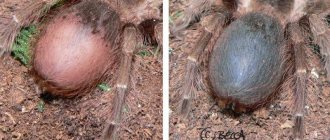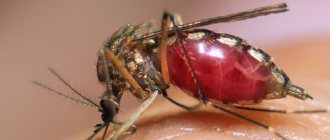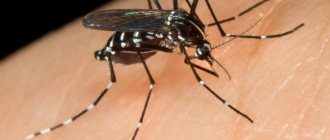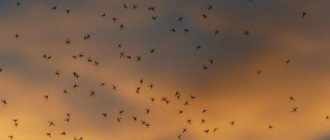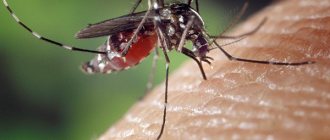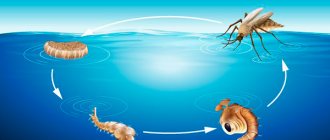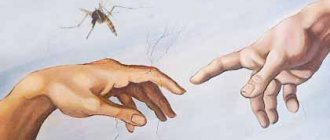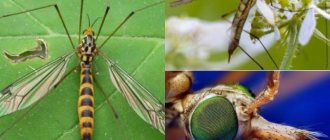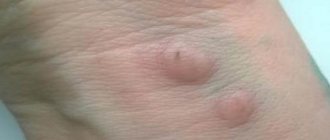Who prefers the bloody menu
When asked which of the bloodsucker insects is a male or a female, scientists give a clear answer: “Look for a woman.” The reproduction of mosquitoes and the preservation of the species is its purpose. It is she who needs protein to lay eggs. And they look for victims exclusively before laying eggs, the rest of the time they are completely peaceful insects. For males, this possibility is not provided for by the creator at all. The structure of its proboscis allows it to drink pollen or plant sap in some individuals, but it cannot bite through human skin.
How does a mosquito use the blood it sucks?
Human blood contains large quantities of nutrients, mainly protein. Only female mosquitoes drink it to lay eggs. Males feed on flower sap, drink nectar and eat pollen. This diet does not contain protein, but provides enough carbohydrates to renew energy.
Unlike other dipterans, which lay eggs once in a lifetime, mosquitoes, thanks to human blood, “delight” with their offspring more than once. The number of clutches depends on how often the female drank the coveted liquid and how much she managed to suck at one time. Many have observed how a mosquito, if not driven away, drinks more blood than it weighs.
If there is nowhere to get blood, then females, like males, switch to plant foods. Some species lay eggs in this case as well. Deprived of protein, the female takes the required amount from her own body, and then, like a butterfly, dies after laying.
How mosquitoes drink blood
Once the female develops into an adult, within a few days she is able to reproduce. As soon as a girl mosquito meets a boy mosquito, she goes in search of the protein she needs. Thus, it can cover a distance of up to one kilometer. The female senses prey very well by the smell of sweat, carbon dioxide, which is emitted by warm-blooded animals, and the heat emanating from the body.
The mechanism of the process of how mosquitoes drink blood is as follows. They find a pulsating area with thin skin. They bite through it where the capillaries are and inject a substance that prevents the blood from clotting. It is mosquito saliva that causes itching, scratching and allergies. How much blood the female will drink depends on how hungry she is. It is very difficult for her to stop and she will suck until her body swells several times. On average, this saturation process takes 3 minutes. After this, she can fly away to lay eggs. Well, if she doesn't get slammed first.
Another argument why mosquitoes drink blood - for them it is a matter of life and death, in the literal sense of the word. With a normal diet, the female lays approximately 200 eggs. She can do this “on an empty stomach.” But, firstly, then the clutch will consist of approximately 40 eggs and their chance of survival will tend to zero. And secondly, giving away its own protein, most often it dies.
Who drinks: female or male
When deciding which mosquitoes drink blood, you should turn to their physiological needs. Considering that the female is responsible for the reproduction of offspring in the mosquito family, only female individuals feed on blood. The menu of male mosquitoes consists of plant food: flower nectar. They do not have such a proboscis and have a slightly different structure of the oral apparatus.
Males need a diet rich in carbohydrates, which gives them a feeling of fullness for a long time. Also, this method of nutrition is the key to the reproduction of some plants, whose pollen is carried by insects while searching for food.
Interesting!
The female mosquito's need for blood is so high that while eating, she cannot stop. The bloodsucker stops drinking blood only when its body expands several times and its abdomen is not completely filled. The number of times a mosquito bites depends on the actions of the victim and the degree of hunger of the female.
Bite me mosquito
As with everything, the most interesting thing about a mosquito bite is the process. We found out why a mosquito drinks blood, but do you know how and how long it takes?
In order to get enough blood, a female mosquito needs a maximum of three minutes. Females bite everyone indiscriminately: from animals to humans. But since people are more concerned about this issue than animals, it is necessary to describe everything using the example of a person.
Many people think that mosquitoes simply pierce human skin with their proboscis (yes, they don’t have a sting like a wasp). But this is not entirely true. They control their trunk, looking for capillaries. When the required capillary is found, the female mosquito secretes saliva into it. After the blood has clotted, the female begins to suck it out. All this happens in one to three minutes.
Interesting fact: it is saliva that freezes the process of blood clotting in the bite area. By the way, this saliva also helps cause itching. Therefore, in order to avoid scratching your skin, it is better to look both ways to see if there is a mosquito on you.
What mosquitoes don't drink blood?
Some types of mosquitoes are able to reproduce even without feeding on blood. The fact is that from their first days their larvae begin to feed on bacteria and detritus , that is, dead tissues found in nature. The larvae of mosquitoes of the Toxorhynchites species actually eat similar creatures. But all of the above is already a high protein food. So why would these mosquitoes look for a source of blood and risk their lives? They understand that this is pointless, and therefore they live quite comfortably.
Toxorhynchites mosquitoes can be very large
Some “urban mosquitoes” also have the ability to survive without human blood. This skill turned out to be vital for them, because some groups are forced to spend their entire lives in half-flooded basements of houses. These waters contain a sufficient amount of organic substances and mosquitoes stock up on protein at the larval stage. So females can lay the first clutch on their own, but then they have to look for human blood.
Do you know that the number of malaria mosquitoes may increase in Russia?
Mosquito breeding
Every person should remember that only female mosquitoes drink blood. Males can live peacefully eating only flower nectar. Females also sometimes drink nectar, but the protein it contains is not enough to form eggs necessary for procreation. So they begin to attack and bite us, because human blood is very rich in proteins. Not only human blood is full of nutritional properties, but also the blood of other mammals. Therefore, not only we suffer from mosquitoes, but also dogs, cats, cows and many other creatures.
Thanks to cats - some of them are good at hunting mosquitoes
Proteins in the blood are digested inside female mosquitoes and converted into organic compounds called amino acids . They, in turn, play an important role in the production of eggs , without which insects cannot become pregnant and lay eggs. When the female looks for a victim and drinks his blood, she has already “slept” with the males. Having collected a sufficient amount of proteins, they wait 2-3 days for the eggs to mature and lay them on the surface of the water. After this, most of the females die, and the surviving individuals again begin to irritate us with their squeaks and bites. They no longer need to mate with males a second time, because their bodies retain a sufficient supply of sperm.
Interesting fact: the squeak of a mosquito is the sound of its wings moving. They swing them up to 600 times per second!
"Mosquito" diseases in Russia
Mosquitoes are found everywhere except Antarctica. Interestingly, regardless of their habitat, be it conservative Russia, where there are still moms and dads, or some progressive France with its “parent one” and “parent two,” mosquitoes show clear gender differences.
Bloodlust
Male mosquitoes are strict vegetarians, feed on nectar, and live short lives. In the evenings they swarm and wait for females. As for the females, they also drink nectar until they meet their male. But after mating, the ladies go wild and go in search of blood. Having smelled prey several kilometers away, they pounce on all living things. Having sucked blood and calmed down a little, mosquitoes lay eggs in bodies of water, after which they become aggressive again - the cycle repeats. Female mosquitoes live from 3 weeks to 3 months.
Unforeseen danger
In addition to the actual bites and local reactions to them, mosquitoes can be a source of real danger. In many countries, different types of mosquitoes carry different diseases. Among the most famous are malaria, yellow fever, Zika, Dengue, and Chikugunya fevers.
When planning a vacation, especially with children, especially with possible excursions to wild and protected places outside of tourist areas, remember that the vivid impressions of visiting some jungle can be completely neutralized by subsequent lengthy diagnostics and treatment. Carefully consider possible risks and consequences. However, even without leaving Russia you can suffer no less from bloodsuckers.
Imported malaria
Few people remember, but back in the first half of the 20th century, malaria was a serious problem in the Soviet Union. Thus, in 1945, more than 4 million people suffered from malaria in the USSR. Thanks to the use of insecticides and mass treatment of patients, by 1960 malaria was almost completely controlled. From that time to the present day, mainly imported cases of malaria (from tropical countries) have been recorded in Russia.
Nevertheless, since the beginning of the 2000s, cases of malaria have been regularly observed in Moscow, which cannot be explained by “importation”: dozens of patients who have not traveled outside the Moscow region for years still manage to catch this disease.
Biologists have explained how mosquitoes choose their prey
An employee of the Department of General Ecology and Hydrobiology of the Faculty of Biology of Moscow State University, Vadim Maryinsky, in a conversation with the Sputnik radio station, said that for mosquitoes when choosing a “victim”, the smell and warmth of a person are of the greatest importance.
“Mosquitoes choose their prey based on their senses, just like all other creatures. The smell that comes from a person and warmth are important to them. You can hear many semi-mythical stories that people with a certain blood type attract mosquitoes. But in reality, everything is somewhat simpler: if a person actively sweats, then it is easier for mosquitoes to find him,” Maryinsky is sure.
This rule also applies to groups of people. The specialist said that the first target of mosquitoes will be the one who sweats the most, and then the insects can switch to the rest.
“When people walk in a group, for example, through the forest or sit on the veranda drinking tea, then after mosquitoes have already found a group of people, they do not really choose who to bite and who not. It cannot be ruled out that they have preferences, but when people are in a group, the preferences are not so pronounced. Mosquitoes “stick” to a person who is actively sweating, but after that they will definitely switch to those who are nearby,” the radio station quotes the biologist as saying.
Scientists from the Siberian State Medical University partly agree with Maryinsky. In their study, they considered body temperature and odors among other factors of the “taste preferences” of bloodsuckers, and concluded that mosquitoes are most attractive to people with blood type I. The study showed that universal donors are bitten twice as often as representatives of group II.
In addition, active blood circulation and metabolism of the victim are important. A person with a high metabolism produces more carbon dioxide, which mosquitoes use to detect it.
“Therefore, a mosquito is more likely to bite an adult, and not a child, a pregnant woman, people with a high body mass index, as well as people engaged in manual labor,” notes the publication of Siberian scientists.
The publication also states that the most effective means of controlling mosquitoes is ultrasonic devices. In addition, oil of angustifolia lavender flowers and vanilla diluted in water can have an effect on bloodsuckers.
Japanese experts add: catnip leaves, which cats love so much, repel mosquitoes. The results of the study by foreign scientists were published at the end of January this year, writes Tsargrad with reference to the scientific journal Science Advances.
This substance, as the Japanese found out, contains nepetalactone, which is safe for people and pets. Mosquitoes tolerate it the worst. Therefore, this component could be used to create affordable natural remedies against insect bites, scientists say.
